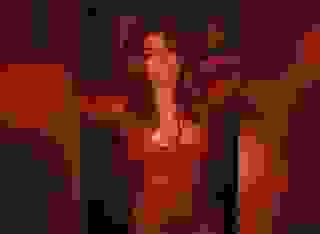Note: You can change font size, font face, and turn on dark mode by clicking the "A" icon tab in the Story Info Box.
You can temporarily switch back to a Classic Literotica® experience during our ongoing public Beta testing. Please consider leaving feedback on issues you experience or suggest improvements.
Click hereOne thing that was working were the barriers of human remains on either side of the road. Avila's men had just managed to get those in place before the counterattack, and they allowed his soldiers a degree of safety as well as a mustering place away from the vengeful Guardsmen. General Ferberg himself was huddled behind the bodies there, frantically issuing orders for more men to make their way up the hill.
Despite the numbers of Guardsmen coming down the hill, the advantage was slowly turning against them. Avila's soldiers just kept pushing forward and even with their high number of casualties thus far, the Guard couldn't keep throwing troops at them forever. Especially once Katla and his forces started to put pressure on the other side of the hill.
For now, they just had to hold on the best way they could, and a brave cadre of veterans sheltered behind the bodies of the fallen and picked off the Guardsmen one by one.
It was only after about twenty minutes of desperate fighting that the first break appeared on the side of the emperor's forces. The Guard was simply out of sheer numbers to throw against them, and they started to be pushed back high on the hill.
"Follow on their tails," yelled Ferberg. "We're gaining ground on them!"
Avila's men began to force their way beyond the human defenses and itch their way closer to the bend. They stayed as low as they could but the sheer number of dead bodies along the way meant many of them had to run, jump, and slide over the dead in order to progress up the hill. Avila used his rifle to shoot one unfortunate Guardsman in the face, leaving a disfigured puddle of blood against the road as his forces surged forward.
Finally, they were in range to take out the second fortification at the bend on the hill. This one was built into the hill itself, using heavy amounts of concrete to create an enclosed space with enough room for about twenty men. The only weakness in the fortification was that the concrete only went up to about waist high. The rest of the space to the roof was open air. While it allowed the men lots of room to see the total picture of what was happening along both the high and low parts of the road, it was also highly susceptible to grenades.
Avila watched as a squad of men was able to close in on the enclosure by crawling their way along the road. They were too close for the men inside to be able to fire upon them without greatly exposing themselves and with the high rate of enemy fire, the remaining Guardsmen were getting pinned down.
One of the squad members was able to toss a couple grenades inside as they ducked for cover. The twin explosions sent a heavy dark smoke billowing from the open section as another squad member rushed forward to clear the room.
"All clear," yelled one of the men.
Those two words unleashed the floodgates. All those men that had been huddled against the road or taking shelter behind the bodies of the dead pushed up and started to bolt up the hill. Once they were around the second bend, it was only a short jaunt to the crest of the palatial hill, and the first men arrived a short while later.
As Lord Avila planted his two feet firmly on the top, he looked around at the sight in front of him. The emperor's palace stood hauntingly close to his current position, looking almost deserted in its appearance. There were several Guardsmen that were fighting in the front position but they were being overwhelmed by the strength of his own men as they pressed forward.
Likewise, the main fortification of the Emperor's Guard was also under assault. Avila's men had pressed past the front gate and were now spilling into the fort in droves. The once rapid gunfire that had greeted all of them on the hill was now down to furious bursts every few minutes when any remaining Guardsmen were encountered.
The rest of the hill was like a ghost town.
"Clear the rest of the fort and dispatch any remaining Guardsmen," said Avila to Ferberg who had been issuing his own orders when Avila caught up to him. "And get the men into that palace and find Aurelius. Bring him to me alive, not dead!"
Ferberg started to direct more men into both structures as Avila moved a distance from the road and sat down against one of the trees on the grounds. He pulled a canteen from his side and drank from it until it was empty. It did little to quench his thirst after that heavy fighting but at least the end was now in sight. Aurelius would not be able to escape much longer.
After catching his breath, he pushed up again and moved closer to the road, looking out over the city as his soldiers continued to disembark from his ships. They stretched out for one long, unbroken line all the way to the coast, and as they reached the top of the hill, many of them were directed to secure what was left of the premises.
Victory was in sight. It was only once Avila saw the battered spearhead of Katla's forces moving up the other side of the hill that he knew the city was secure.
Dagobern was his and with it, the Swabian Empire.
About twenty minutes after Katla's forces crested the hill, the man himself came jogging over to meet with Avila (an impressive feat for someone of his age). As he came to a stop, he knelt in front of Avila and kissed his boot. It was a symbolic gesture but one that confirmed what everyone already knew.
"Congratulations on your victory, my emperor," said Katla as he rose to his feet. "The city is yours."
Avila smiled with considerable satisfaction. "How was the fight on your side of the city?"
"Rather light compared to yours it seems," replied Katla. "We didn't meet serious resistance until we got to the hill, but it looks like your men drew the bulk of the Guardsmen away. We didn't have to kill nearly as many of them to get here."
Avila nodded. "We took considerable casualties along the way. The fighting was fierce. There were a few moments where I thought we might be pushed down the hill but in the end, their numbers just weren't enough to keep up the momentum."
Katla sneered. "I hope those Guardsmen that were here are all dead now. Woe to any of them that are still alive right now."
Avila grinned. "Woe indeed."
It was just short of an hour later when a steady stream of prisoners were brought to Avila, many of them hiding in the palace. The servants made up the majority of the bunch, most of them not worthy of a second glance. Of more interest to Avila were several of Aurelius' ministers, including the one for war who it would seem was particularly discredited after today.
Another batch of prisoners made up Aurelius' family. His wife was successfully deposited at Avila's feet, a woman around his age with striking looks and exotic features. There were also about five concubines that were detained with her, many of them around twenty in age and all wearing various sheer garments to denote their status.
The last prisoner was the one that Avila most wanted to see. He was dropped at his feet by two of Avila's men while being restrained from behind. He looked a lot worse than the last time Avila had seen him. His silver hair and beard were thick with matted blood. His nose was bruised and quite obviously broken by the bend in the middle. He had another bruise on his cheek, indicative of a rifle butt that had caught him earlier in the day. He would have been a pathetic figure if not for one feature—his eyes, which remained burning with hatred.
"Hello, Aurelius," said Avila cheerfully. "It's so wonderful to see you again."
*****
The morning after the arrival in Sorella, Captain Lewis Barnabas of theCenturion spent the majority of it fuming while keeping an eye on shore. It had been a tense evening for him, but he was always tense when he was in a war zone. He highly expected the savages on land to attack at any time, especially now that they seemed to let their guard down with rumors of peace.
Barnabas scoffed to himself.Peace. How can there be peace with rebellious savages?
Furthermore, how could Admiral Easterbrook accept them at their word? He'd read the dispatch when it came in from the flagshipDestiny calling on all of them to stand-down while Easterbrook went to negotiate. Of course that order came from Commander Wainwright, another officer that Barnabas felt dishonored the Javan flag. He despised the woman, mostly because it always seemed like she was having a joke at his expense. In a proper navy, he would be allowed to punish her as the senior officer but seeing as she was Easterbrook's personal pet, she was quite out of reach.
The order that she passed on filled him with disgust to know that these Fourthie savages were this close to getting away with murder against an innocent Javan viceroy. How could anyone treat these people like they were civilized was beyond him. But that's all that they seemed to do since the task force arrived at this godforsaken island.
Then again, such was life sailing under a man like Easterbrook.
The man was a mystery to him. He was an officer whose star had risen rapidly in the last year, and it showed in his jarring actions and questionable decisions. He seemed to let his experience with the Fourthies go to his head, treating them far beyond their station than what was proper. It made no sense to Barnabas. It wasn't like they were Javans, or Occitanians or Ruthenians for that matter, who could rightly be called part of civilization.
Why did Fourthies merit such preferential treatment?
It was a question that he couldn't answer but he was determined that one day, the admiral would have to answer for it. Barnabas added the order to the written file he kept in his quarters of all of the admiral's actions that he disagreed with, a file that was already quite full. It was also one he was all too prepared to hand over to Admiral Bancroft when this little campaign was over with. Bancroft especially enjoyed all the tabs that Barnabas had given him on Easterbrook on the way over, promising the captain a fruitful reward once he was back in Java.
For Barnabas, it allowed him to kill two birds with one stone—he could earn favor with Bancroft while seeing that an erratic leader like Easterbrook got his just rewards.
Seeing no sign of any hostility from the Sorellans (yet), Barnabas retired from the bridge and made his way back to his own quarters. There was a fresh cup of tea waiting for him, courtesy of his deputy who knew that the captain always preferred his tea at this time of the morning. He maneuvered to his desk and sat down to do some work.
Barnabas was long since past his second cup of tea when another dispatch came in. This one, like the earlier one, came from theDestiny but they were Easterbrook's words. It proclaimed that the Sorellans had been sufficiently punished and that they would be returning on their journey to Picardy. It detailed no further actions to be performed on the island and said they would sail first thing the next morning.
If Barnabas had had tea in his mouth, he would have spit it out.
Punished? Is he mad?
He pushed out from his desk and approached the porthole window in his quarters and looked out at the great mass of Sorella. There was no smoke, no burning ships, and no mass of dead soldiery. Likewise there was no chaotic radio chatter, no booming of naval guns, and no assaults by the marines. There was no war so how could the Sorellans have been sufficiently punished? How could they leave without carrying out their orders?
Easterbrook had made a farce out of the Admiralty's commands. There had been no "punishment" of the Sorellans. If anything, those savages were probably sitting fat and happy right now at having escaped what fate had prepared for them. Now they would know that they could kill a Javan viceroy and suffer no consequences for the action! Such a thought was a total perversion of justice that it set his blood afire.
Barnabas huffed loudly as he put a copy of the order into his Easterbrook file. He then stormed up from his desk and left his quarters. He would see to it that Easterbrook wouldn't get away with this. He moved quickly throughout the ship until he came to the communications room where he found one lieutenant and one sailor going about their duties.
"Both of you, out now," yelled Barnabas, watching with a degree of satisfaction as they hurriedly scampered from the room.
Once they were gone, he closed the door and sat down to compose his own dispatch. Once he was happy with the result, he had it transmitted back to the Quiller's Cove naval base where it would be sent back to Java. A wicked smile appeared on his face at having done the deed.
I won't let you make a mockery of this fleet, he thought to himself.Just wait until Admiral Bancroft finds out what you've been up to.
*****
The Foreign Minister of Ruthenia, Alexander Krupin, was not in a great mood. In fact, his mood had been deteriorating ever since this morning. The first thing that set him off was a hole in his favorite pair of shoes, something he quickly noticed while traversing the wet streets of Ruthenian capital city of Merv. With his foot solidly drenched, he limped into the foreign ministry and didn't stop until he reached his office, putting on a fresh pair.
His problems didn't end there. One of his spies had gotten a message back to the ministry that the Javans were assembling a sizeable army on the northern coast, opposite of Occitania. The spy seemed certain that this force would be ready to ship out within just a few weeks, undoubtedly being used to pound the final nail into the Occitanian coffin.
While that was daunting, the worst part about his day was coming back from where he'd just been. The Ruthenian army was assembling outside of Merv based upon Emperor Pavel's instructions but as of this morning, they were no closer to becoming a force that had any kind of cohesion whatsoever. From what Krupin could see of this morning's drills, most of their soldiers were rusty at best or incompetent at worst. Krupin had never seen so many out of shape men in his life. Watching them go through drills was like watching an execution—he just wanted someone to put the poor bastards out of their misery.
The worst part about it was that it was screwing with the timetable that they needed to maintain to have a chance of winning the war. That convoy was supposed to leave in two weeks' time in order to get to Occitania to join forces with them. Those men outside of Merv couldn't be properly called an army at this point, and he highly doubted they would be any better by the time they left the city.
Either way, Krupin now had to send a message back to the Occitanian minister letting him know that all was well with the Ruthenian army and that they would soon set sail to beat back the Javan beast. The words felt ironic coming off of his pen—he highly doubted they could execute a proper landing let alone fight off the Javans.
All in all, not only was Krupin in a foul mood that morning, but now he was nervous. He was most definitely the architect of this war, and if things started to go poorly, he would feel the weight of their failures on his own head. It was an unenviable position, especially for someone who'd fought hard to convince the emperor that they could win this conflict if they joined at just the right time.
What he really needed was a distraction. He needed a way to tie down Javan forces right now so he could attempt to delay the inevitable invasion of Occitania.
That's when he had the idea.
It took more than an hour and a half for Fedor Popov, the spy chief of the Ruthenian Empire, to answer Krupin's summons but the man finally made his way into his office with apologies already spilling out.
"A thousand apologies, sir," said Popov as he came to Krupin's desk. "I was in the middle of another engagement when your message arrived, and it was only now that I was able to get over here."
Krupin waved his hand. "No need to apologize, Popov. I understand that I asked for you out of the blue. Have a seat."
Popov's heavy frame soon crashed into the chair in front of his desk. It was then that Krupin noticed the man had been huffing. Wherever he came from, he must have ran all the way here.
"What did you wish to discuss, sir?" asked Popov once he'd settled down.
"I took a little trip over to the parade grounds for the army this morning," said Krupin with a disgusted face. "Long story short, I wish I hadn't. I don't know how those 'soldiers' are going to take on the battle-hardened Javan ranks and hope to prevail."
Popov winced. "Getting that army into fighting shape and moving it across the ocean is key to your plan."
"Don't I know it," muttered Krupin. "But it appears that the Javans are moving more quickly than we'd counted on. If they move before we're ready, they could crush the Occitanians rather easily. Even if we do manage to land the army, I'm half afraid that any serious pressure on them is going to route them right away."
"I'm sure with adequate training they'll be more than fine in the field," said Popov.
"I want them to be more than fine," snapped Krupin. "My whole plan pivots on this point! We have to make sure we give the Occitanians more time. We have to delay that invasion as long as possible."
"What did you have in mind? How can I help in that regard?" asked Popov. "I'm assuming you want my help, correct? That's the reason you've called me in today?"
"You're correct," said Krupin quietly. "I want you to tell me more details about your Tyrol operation."
Popov smiled fondly. "I could talk about that for hours."
"We don't have hours so spare me the unnecessary details," said Krupin. "Give me the facts."
"All right," said Popov with a sullen tone. It was obvious that he was looking forward to talking about his star operation. "As you know, Tyrol is one of the newest members of the Javan Empire. It's only been about a hundred and fifty years since the last significant Tyrolean resistance was snuffed out by the Javans and they were incorporated into the empire, uniting the entire continent under the dragon banner."
Popov continued, "As you know, the Tyroleans are quite a different people temperamentally from the Javans. They are warlike and aggressive, much preferring the sanctuary of their mountain towns to the cosmopolitan nature of their Javan neighbors. For that reason, there's always been tension between the two peoples ever since the continent was united. We've always sought to exacerbate that tension, having done so most recently during the Desert War."
"I don't need a history lesson, Popov," said Krupin with a heavy sigh. "I just need to know about the operation."
"My network of spies is heaviest in Tyrol where we funnel money to the various towns and leaders there in order to tie up Javan resources. In times of peace, that money might be to allow a decay of Javan infrastructure which would force their government to pay out for roads much quicker than they would otherwise do so. We pay them to report bad grain harvests or to let those same harvests go entirely rotten. Their leaders are always too happy to poke the Javan dragon short of an outright declaration of war."
"Since we are in wartime, what have your men been inciting there now?" asked Krupin.
"Things in Tyrol are worse off than we believe," explained Popov. "The entire region is in poor shape because of Javan policy against them. You see, once the Javans figured out what the Tyroleans were doing, they stopped funneling so much money back to the local communities. That's when infrastructure really started to decay. It was our money during the Desert War that incited a small rebellion there but it was quickly put out by Javan soldiers while most of them were on their way down here."








